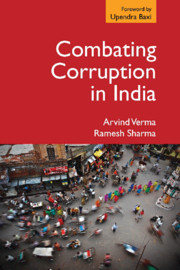1 - Introduction
Published online by Cambridge University Press: 13 November 2018
Summary
April 2011 was the time when emotions were running high and the anti-corruption movement was in full swing in India. Hundreds of thousands of people from all age groups and backgrounds—young, old, male, female, educated and school dropouts—were out on the streets determined to end the scourge of corruption in the country. Led by Anna Hazare, who according to many, exhibited the same qualities of integrity, simplicity and steadfastness as Gandhiji, the movement for Lokpal had reached its zenith. Police raids, threats of arrests, questions about motives, foreign money and media manipulation all failed to stop the juggernaut from rolling on. The government was finally brought to its knees after months of obstinate refusal to accede to the demand of a Lokpal (an ombudsperson) to deal effectively with corruption.
Cabinet ministers came down from their high pedestal to negotiate with the leaders of the movement. The then Prime Minister Manmohan Singh, even offered to meet Anna Hazare and his compatriots. Assurances were given to establish the Lokpal though it would still take years to take shape. The movement finally did lead to the Lokpal and Lokayuktas Act, 2013 that provides for the establishment of a body of Lokpal for the Government of India and Lokayuktas for the states. These institutions can inquire into allegations of corruption against public functionaries, however high and mighty, including the Prime Minister under certain dispensation.
Like every citizen of the country and every person interested in ending corruption in India, we, the authors of this book, too were following the evolving protest movement keenly and with passion. While we appreciated the mass mobilization and the determination with which Anna Hazare pursued the demand for Lokpal, we were debating amongst ourselves if such an institution could really combat corruption effectively in the country. Both of us have served many years in the Indian Police Service (IPS) and have considerable experience in criminal investigation. One of us even commanded the premier anti-corruption agency of a major Indian state and handled a large number and variety of high profile corruption-related cases. Based on our experience and knowledge of criminal justice system of India, we were certain that the mass protest movement might, alas, be in vain. The Lokpal will not be effective in handling corruption in the country because the roots of corrupt practices run deep.
- Type
- Chapter
- Information
- Combating Corruption in India , pp. 1 - 16Publisher: Cambridge University PressPrint publication year: 2018

